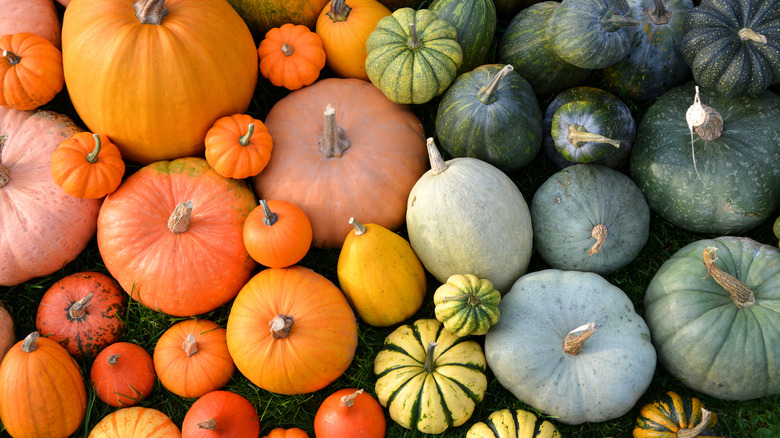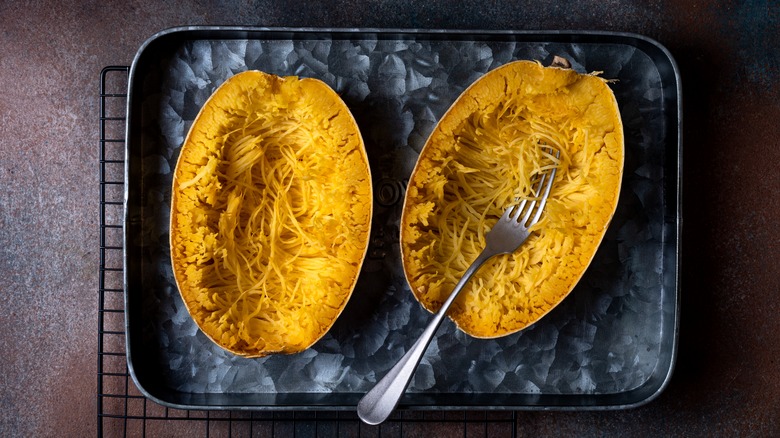The Absolute Best Winter Squash For Your Next Casserole
Winter squash is the unsung superstar of cold-weather cooking. Andrew Zimmern knows this. The celebrity chef and television personality is an Emmy winner, a four-time James Beard Award winner, and a huge winter squash fan. Why? According to Andrew Zimmern, winter squash have a naturally mild, slightly sweet flavor that absorbs spices well, making them a versatile, available tool in the mid-winter home cook's seasonally-dwindling vegetable arsenal. Not only are they tasty, but winter squashes are also packed with antioxidants to help keep you healthy through flu season (via WebMD). They also contain mood-boosting vitamin B6 (helpful for folks battling seasonal depression) and promote healthy skin, which can be tough to maintain during dry winter months. Today, we're talking about one particular type of winter squash that's stealing the show this season: Spaghetti squash.
The oblong spaghetti squash ranges in color from cream to orange, per Betty Crocker. Unlike other bumpy winter squashes, it flaunts smooth skin and an interior pit full of seeds that can be roasted. If you're late to the party, don't worry. You're not alone. Admittedly, spaghetti squash is a sleeper hit amongst U.S. home cooks. In China, foodies have been cooking it since the 1850s, says Food Network, but it didn't become popular in America until Chinese seed distributors brought the squash in 1936. Now, some time has passed, and we're (hopefully) a little wiser, and we're singing the praises of the tragically underrated spaghetti squash. Here's why it's perfect for your next casserole.
Spaghetti squash is mild and versatile
Not only is spaghetti squash in season when very few other veggies are, but it's also a nutrient-dense culinary chameleon. Its "extremely mild flavor," says Zimmern, makes spaghetti squash an ideal fit for gratins and (of course) casseroles. It doesn't present the more distinctive sweet, nutty taste of other winter squashes, which have the potential to overpower a dish. Plus, spaghetti squash is uniquely texturally stringy (via Food Network). Due to this pull-apart stringiness, mild flavor, and high absorbency, spaghetti squash makes an apt pasta substitute, as its name implies. Try it out in this Spaghetti Squash Lasagna and see what we mean.
It's relatively easy to prepare, too: it can be halved and roasted in the oven, roasted whole, or even cooked in an Instant Pot. In this Spaghetti Squash with Sage and Walnuts recipe, the squash is simply halved, de-seeded, roasted, and pulled apart into its natural strings all in the skin. Per Healthline, just one cup of spaghetti squash is packed with 2.2 grams of fiber, 6% DV for vitamin C, 9% DV for vitamin B6, and 7% FV for manganese, at only 42 calories and 10 grams of carbs. Since it is harvested from early fall to the end of winter, the vegetable can be a hearty staple for cold-weather kitchens. If stored in a cool, dry place, that spaghetti squash will keep for up to two months.

